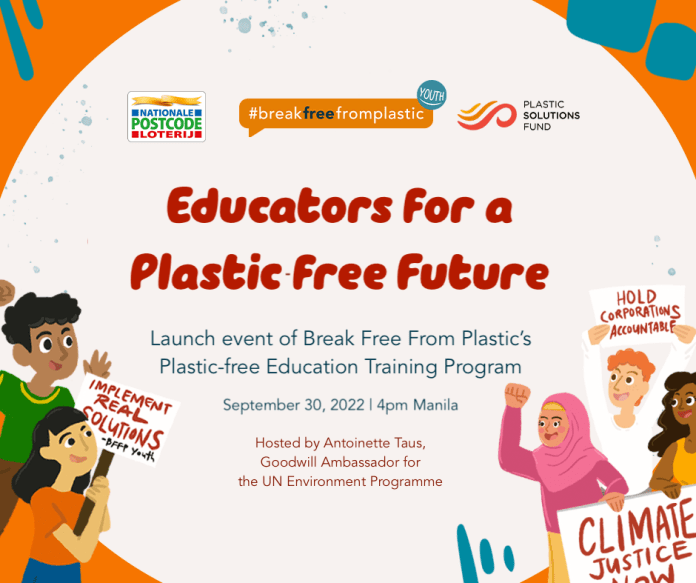The advocacy group Break Free From Plastic has introduced a training program aimed to assist educators in integrating plastics education into existing curricula.
At least 110 educators from 32 countries in Asia, Africa, and Latin America joined the launching of the “Plastic-Free Education Training Program” last week.
In a statement, BFFP said the program seeks to “raise awareness and change people’s mindsets on the use of plastic worldwide.”
“This project aims to enhance the systemic thinking in young people’s learning spaces and to ensure that teachers are equipped in the education of young people on the plastic pollution lifecycle and its impacts, beyond being a waste management issue,” the statement read.
The training program provides a “plastic-free education curriculum” for learners aged 5 to 18 and a module that will support educators in integrating the curriculum into their lesson plans.
The program, which will be conducted online, “is a hybrid of asynchronous and synchronous training sessions.”
“It is essential that we build a culture of awareness and active participation in the fight against plastic pollution,” said Dexter Galban, assistant secretary for Youth Affairs and Special Concerns of the Philippines’ Department of Education.
Galban said culture building should start with empowering the youth in making more “enlightened decisions” and “more involved in protecting our world.”
Diosdado San Antonio, head of the Educational Research & Innovation Office of the Southeast Asian Ministers of Education Organization Regional Centre for Educational Innovation and Technology, said the program “underscores the important role of educators in molding and supporting young people as they navigate the complexities of (plastics and climate) crises and push for real, long-term change.”
“Given how this generation’s future is on the line, education systems need to ramp up the provision of support to the young, in addressing these crises,” said San Antonio.
Mohammed Muhibur Rahman, additional secretary of the Ministry of Education in Bangladesh, said his country needs education on how to manage plastic, which “was once a great invention for our civilization but later on, it also became a curse for us.”
Nur Fitriana of the Ministry of Education and Culture in Indonesia said awareness about the crisis of plastic waste “is important not only in schools but also in communities and families.”
“Many teachers shall understand that it is not only a concept of ‘why’ we can’t use plastic, but it also encourages the critical thinking of students so that they can innovate and be creative,” said Fitriana.
BFFP noted that there are 1.8 billion people aged between 10-24 years, which is “the largest generation of youth in history.”
The group said that it is today’s generation that’s “most affected by both the plastics and climate crises and that will suffer the most from the effects of these in their adulthood,”
“It is now crucial, more than ever, to empower educators in having the right tools to support their students towards a just and plastic-free future. This is also a pivotal point for educational institutions and agencies to embody this plastic-free narrative by providing this knowledge and awareness to young citizens,” the group said.









